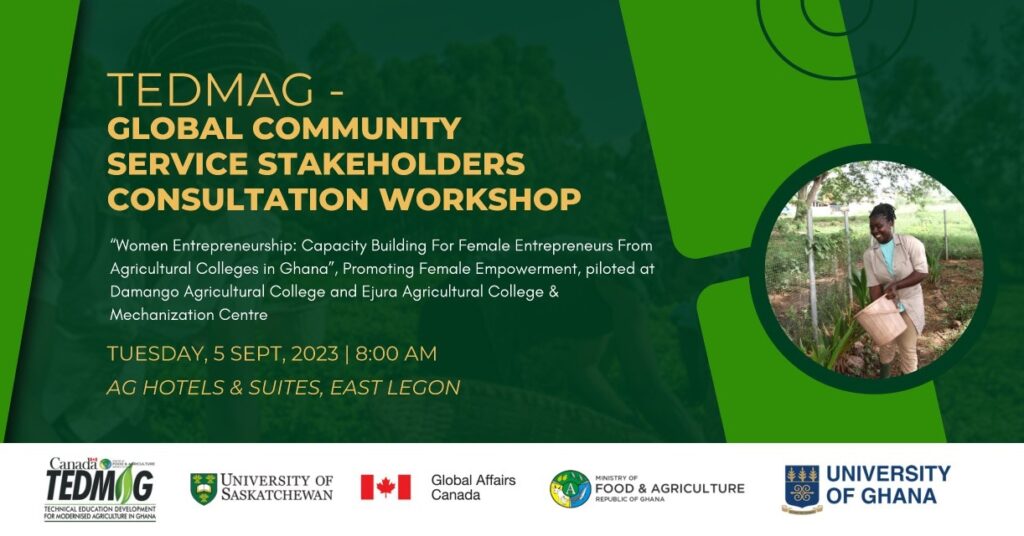TEDMAG Stakeholder Consultation Workshop
FOR IMMEDIATE RELEASE
Technical Education Development for Modernizing Agriculture in Ghana (TEDMAG) Consortium to Host Global Community Service Stakeholder Consultation Workshop
The Technical Education Development for Modernizing Agriculture in Ghana (TEDMAG) Consortium is pleased to invite members of the media, funding partners, beneficiary agricultural colleges, government representatives, women in agriculture, community leaders, and other key partners to a one-day Global Community Service Stakeholder Consultation Workshop.
The workshop will be held on Tuesday, September 5, 2023, at the AG Hotels & Suites located in East Legon, Accra. The event is part of the Global Community Service Project, an initiative co-funded by TEDMAG, aimed at promoting women entrepreneurship and capacity building for female entrepreneurs from the Agricultural Colleges in Ghana.

The pilot project, currently being implemented at Damongo Agricultural College and Ejura Agricultural College & Mechanization Centre, seeks to empower women in agriculture and create novel opportunities within the sector. As part of its goals, the project aims to establish a pilot Gender and Women’s Study Initiative (GWSI) and roll-out this program at two agricultural colleges in Ghana, ensuring culturally responsive pedagogy.
Furthermore, the project aims to develop coaching and mentorship programs for young women at the agricultural colleges, providing them with the necessary skills and knowledge to excel in their entrepreneurial endeavors. Additionally, the project aims to raise awareness of female agripreneurial capacity through outreach activities, building acceptance and support for female graduates and entrepreneurs in Ghana’s agricultural sector.
The stakeholder consultation workshop will serve as a platform for the partners to collaborate and seek input towards driving the vision and direction of the pilot project. The valuable insights and perspectives shared during the workshop will contribute to the successful implementation of the project’s goals.
TEDMAG firmly believes that women play a critical role in creating a more peaceful, equitable, and sustainable future. The workshop aims to bring together self-empowered communities, colleges, female tutors, and students to help build a successful future in agriculture for Ghana.
“We are delighted to invite all key stakeholders to join us in shaping the future of this important project,” said Professor Mary Buhr, TEDMAG Principal Investigator. “By working together, we can empower women in agriculture, promote gender equality, and create a vibrant agricultural sector for the benefit of all.”
Attendees of the workshop will have the opportunity to engage in discussions, share expertise, and network with other stakeholders committed to promoting female empowerment in the agricultural sector.
We look forward to seeing you at the Stakeholder Event! Contact the TEDMAG Project Manager,
Derrick Owusu-Ansah, (0509400957/0302779236 or doansah@umapghana.org) with any comments or questions.
Visit our social media handles on Facebook, Instagram and Twitter and our website https://umapghana.org to read more on the project.
About TEDMAG Project
The Technical Education Development for Modernised Agriculture in Ghana (TEDMAG) Project is under the auspices of the Ministry of Food and Agriculture (MoFA) and has been implemented since January 2017 by a consortium namely, University of Saskatchewan – Canada, University of Missouri – USA and the University of Missouri Assistance Programme-Ghana (UMAP-Ghana) with funding from Global Affairs Canada under the Modernising Agriculture in Ghana Programme (MAG). TEDMAG has upgraded education of agricultural extension agents and provided high-quality continued education of extension agents. TEDMAG has successfully reoriented agricultural extension training in agricultural colleges to target agribusiness, farm management and value chain technical/vocational skills of graduates and extension educators and simultaneously improved Ghana’s ability to advance its agricultural policies. These great fits have been achieved through college curriculum upgrade, extension training, and upgrade to pertinent college infrastructure (rehabilitation, retooling and upgrade).

